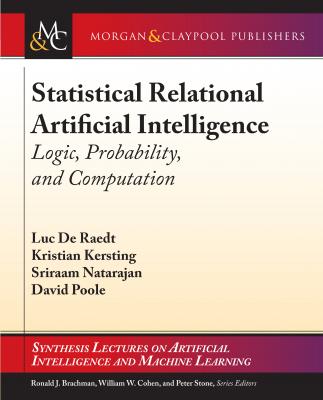Statistical Relational Artificial Intelligence. Luc De Raedt
Читать онлайн.| Название | Statistical Relational Artificial Intelligence |
|---|---|
| Автор произведения | Luc De Raedt |
| Жанр | Компьютерное Железо |
| Серия | Synthesis Lectures on Artificial Intelligence and Machine Learning |
| Издательство | Компьютерное Железо |
| Год выпуска | 0 |
| isbn | 9781681731803 |
All of the representations are required to be finite (for otherwise they cannot be written down), but the grounding does not need to be finite. The logic-programming based languages such as ICL and Problog allow function symbols which means the grounding is infinite. MLNs have been extended to infinite domains [Singla and Domingos, 2007]. So-called nonparametric Bayesian approaches such as NP-BLOG [Carbonetto et al., 2005], infinite (hidden) relational models [Kemp et al., 2006, Xu et al., 2006], and relational Gaussian processes [Chu et al., 2006, Yu et al., 2006, Yu and Chu, 2007, Silva et al., 2007, Xu et al., 2009b] also allow for an unbounded number of individuals. These models use stochastic processes to specify how the random variables and their associated parameters are generated.
3.2 TWO EXAMPLE REPRESENTATIONS: MARKOV LOGIC AND PROBLOG
We now review two relational probabilistic model formalisms, which are probably most representative of the two main streams in StarAI: Markov logic and ProbLog. Markov logic [Richardson and Domingos, 2006] upgrades Markov network toward first-order logic, whereas ProbLog [De Raedt et al., 2007] is a probabilistic Prolog based on what has been called the distribution semantics [Poole, 1993b, Sato, 1995]. While Markov logic is a typical example of an undirected knowledge-based model construction, ProbLog is a directed model that can be seen as a relational probabilistic programming language. Furthermore, while Markov Logic is an example of an approach that extended a probabilistic graphical model with logic, ProbLog extends a logic programming language with probabilistic primitives. For implementations of Markov Logic and Problog as well as further materials on how to use them, see http://alchemy.cs.washington.edu/ and https://dtai.cs.kuleuven.be/problog/.
Both representations induce a probability distribution over possible worlds, where a world corresponds to a Herbrand model. The probability of a formula is the sum of the measures of the possible worlds in which it is true.
3.2.1 UNDIRECTED RELATIONAL MODEL: MARKOV LOGIC
Markov logic combines first-order logic with Markov networks. A Markov logic network consists of set of weighted first-order formulae. The probability of a world is proportional to the exponential of the sum of the formulae that are true in the world.
The idea is to view logical formulae as soft constraints on the set of possible worlds. A positive weight on a formula increases the probability of the worlds that satisfy the formula, and a negative weight on a formula decreases the probability of the worlds that satisfy the formula.
Example 3.8 Consider the following example (adopted from [Richardson and Domingos, 2006]). Friends & Smokers is a small Markov logic network that computes the probability of a person having lung cancer on the basis of her friends smoking. This can be encoded using the following weighted formulas:
Конец ознакомительного фрагмента.
Текст предоставлен ООО «ЛитРес».
Прочитайте эту книгу целиком, купив полную легальную версию на ЛитРес.
Безопасно оплатить книгу можно банковской картой Visa, MasterCard, Maestro, со счета мобильного телефона, с платежного терминала, в салоне МТС или Связной, через PayPal, WebMoney, Яндекс.Деньги, QIWI Кошелек, бонусными картами или другим удобным Вам способом.
